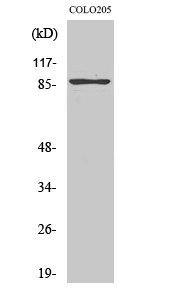TLK2 Polyclonal Antibody
- SPECIFICATION
- CITATIONS
- PROTOCOLS
- BACKGROUND

Application
| WB |
|---|---|
| Primary Accession | Q86UE8 |
| Reactivity | Human, Mouse |
| Host | Rabbit |
| Clonality | Polyclonal |
| Calculated MW | 87661 Da |
| Gene ID | 11011 |
|---|---|
| Other Names | TLK2; Serine/threonine-protein kinase tousled-like 2; HsHPK; PKU-alpha; Tousled-like kinase 2 |
| Dilution | WB~~Western Blot: 1/500 - 1/2000. ELISA: 1/5000. Not yet tested in other applications. |
| Format | Liquid in PBS containing 50% glycerol, 0.5% BSA and 0.09% (W/V) sodium azide. |
| Storage Conditions | -20℃ |
| Name | TLK2 (HGNC:11842) |
|---|---|
| Function | Serine/threonine-protein kinase involved in the process of chromatin assembly and probably also DNA replication, transcription, repair, and chromosome segregation (PubMed:10523312, PubMed:11470414, PubMed:12660173, PubMed:12955071, PubMed:29955062, PubMed:33323470, PubMed:9427565). Phosphorylates the chromatin assembly factors ASF1A and ASF1B (PubMed:11470414, PubMed:20016786, PubMed:29955062, PubMed:35136069). Phosphorylation of ASF1A prevents its proteasome- mediated degradation, thereby enhancing chromatin assembly (PubMed:20016786). Negative regulator of amino acid starvation-induced autophagy (PubMed:22354037). |
| Cellular Location | Nucleus. Nucleus, nucleoplasm. Cytoplasm, perinuclear region. Cytoplasm, cytoskeleton. Note=Colocalizes with the cytoplasmic intermediate filament system during the G1 phase of the cell cycle (PubMed:10455159). Present in the perinuclear region at S phase and in the nucleus at late G2 (PubMed:10455159) |
| Tissue Location | Detected in placenta, fetal liver, kidney, pancreas, heart and skeletal muscle (PubMed:9427565). Highly expressed in testis (PubMed:9427565, PubMed:9662073). Detected in spleen, thymus, colon, ovary, small intestine, prostate and peripheral blood leukocytes (PubMed:9662073). Almost undetectable in liver and lung (PubMed:9662073). |

Thousands of laboratories across the world have published research that depended on the performance of antibodies from Abcepta to advance their research. Check out links to articles that cite our products in major peer-reviewed journals, organized by research category.
info@abcepta.com, and receive a free "I Love Antibodies" mug.
Provided below are standard protocols that you may find useful for product applications.
Background
Serine/threonine-protein kinase involved in the process of chromatin assembly and probably also DNA replication, transcription, repair, and chromosome segregation. Phosphorylates the chromatin assembly factors ASF1A AND ASF1B. Phosphorylation of ASF1A prevents its proteasome-mediated degradation, thereby enhancing chromatin assembly. Negative regulator of amino acid starvation-induced autophagy.
If you have used an Abcepta product and would like to share how it has performed, please click on the "Submit Review" button and provide the requested information. Our staff will examine and post your review and contact you if needed.
If you have any additional inquiries please email technical services at tech@abcepta.com.













 Foundational characteristics of cancer include proliferation, angiogenesis, migration, evasion of apoptosis, and cellular immortality. Find key markers for these cellular processes and antibodies to detect them.
Foundational characteristics of cancer include proliferation, angiogenesis, migration, evasion of apoptosis, and cellular immortality. Find key markers for these cellular processes and antibodies to detect them. The SUMOplot™ Analysis Program predicts and scores sumoylation sites in your protein. SUMOylation is a post-translational modification involved in various cellular processes, such as nuclear-cytosolic transport, transcriptional regulation, apoptosis, protein stability, response to stress, and progression through the cell cycle.
The SUMOplot™ Analysis Program predicts and scores sumoylation sites in your protein. SUMOylation is a post-translational modification involved in various cellular processes, such as nuclear-cytosolic transport, transcriptional regulation, apoptosis, protein stability, response to stress, and progression through the cell cycle. The Autophagy Receptor Motif Plotter predicts and scores autophagy receptor binding sites in your protein. Identifying proteins connected to this pathway is critical to understanding the role of autophagy in physiological as well as pathological processes such as development, differentiation, neurodegenerative diseases, stress, infection, and cancer.
The Autophagy Receptor Motif Plotter predicts and scores autophagy receptor binding sites in your protein. Identifying proteins connected to this pathway is critical to understanding the role of autophagy in physiological as well as pathological processes such as development, differentiation, neurodegenerative diseases, stress, infection, and cancer.


